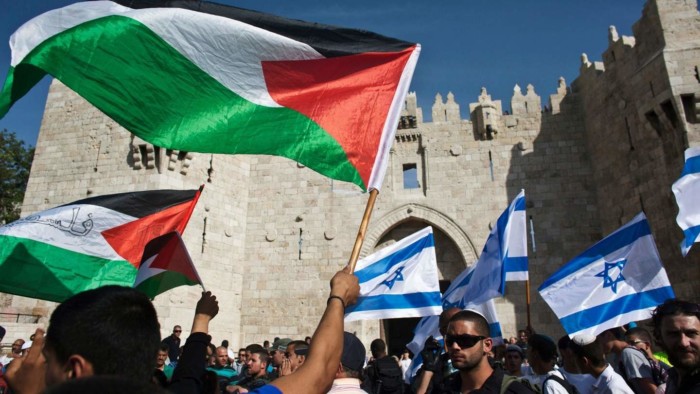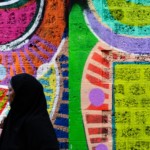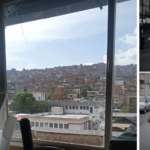The first simple conclusion from the ongoing clashes between Israel and the Palestinians is that the peace agreements between Israel and some Arab countries held. In fact, beyond the official protests, no Arab country that signed a peace agreement with Israel is supporting the Palestinians firing Iran-made new-generation rockets at Israel.
The conflict is and remains internal and the Palestinians are failing to internationalize it.
The main reason why this happens is that unlike in the first Cold War with the USSR, this political clash is outside the new US-China Cold War. The Middle East now has no strategic relevance in the ongoing “Cold War”.
Before the fall of the Soviet Empire, the region was for decades the center of the main proxy wars between the US and USSR, and victories and defeats by either side reflected the political fortunes of their patrons. Now China does not have the same involvement in the Middle East as the Soviet Union, and the local oil is not as strategic as it was 40 years ago.
Moreover, given the complexity of the region, China is not interested in taking sides for or against Israel, Egypt, Saudi Arabia, Iran, or Turkey. With each of these actors, Beijing prefers to have its hands free. Besides, yes, Beijing could have an interest in getting the United States bogged down in the Middle East, but it may not know how to get this done without having the Middle East blow up in its face. The Middle East is crucial for China’s supply of oil and gas and it’s too delicate to try to tamper with it too much.
Without the big powers (US-China) horizon, the international engagement in which the Palestinian question is inserted today is substantially three-way, with Turkey, Iran, and the variable pole of Israel-Egypt-Saudi. Russia maintains delicate contacts with each of the three poles, even if it is colder with Turkey. The US is hostile to Iran (although relations could be improving) but maintains good relations with the other two poles.
In this chessboard, Iran, with its supporters in Damascus and with Hamas and Hezbollah, is relatively more isolated than the other two regional blocs.
Turkey has stopped Russians in Syria, Libya, and the Caucasus with American support and has also lent the US a crucial hand in the region. Today perhaps it seeks more political dividends. But it cannot go too far. Ankara may want Israel to be politically weaker but not too weak, because it knows that Palestinians are unreliable and because it is aware of the Israel-US structural axis, vital also for Turkey.
Iran is certainly interested in advancing its agenda in the region, and some of its leaders may be very bellicose, but Tehran has its hands full by supporting wobbling Syria and the Houthi in Yemen, and by trying to get its nuclear program running despite successful Israeli sabotage. It may not want to risk an exasperating confrontation with Israel and the Saudis.
Conflicting domestic agendas
There are various internal problems in the region that need to be rightly addressed.
There is an issue in Israel, where Israeli Arabs and Jews may need to be more integrated. There is a problem in Saudi Arabia and Egypt, where radical Muslims must be marginalized. There is a problem in Turkey, where the returns cannot be only those of war but more secularism is needed and that would help the country’s relations with the European Union and the US and the economy.
These are all sensitive issues but without the fuel of a second Cold War they are not so explosive.
In reality, it is a question of finding more patience and concrete, meticulous work.
In this, the efforts of the Holy See become more and more fundamental. The pope, who talks to the imams of Egypt, Dubai, and Iraq, does not provide immediate results, but it is precisely that mason-work that puts together different stones to build a house by attaching them all with the same mortar, made of patience and decreasing anger.
As for the Palestinian cause, this should be a time for deep reflections. Originally Palestinians were able to cash in on the sense of guilt of the Arabs and thus had a huge leverage, further multiplied by the many holdups of the first Cold War. But as Arab countries slowly but at a sustained pace moved away from the blackmail, some of the Palestinian leadership turned to being the tool of the regional anti-Israeli forces, be it Iran or Turkey.
In return, it got aid of various sorts, unevenly distributed among the population. But as the power of this second blackmail over Israel is dwindling over time, the returns of being a tool of foreign aims are also diminishing.
Then Palestinians should develop new ideas promising lasting peace in the region that will build on the actual presence of Israel and turn the region into a hub of prosperity and not of war. This will not be easy, but bargaining power increases or decreases over time, despite being right or wrong.
The Palestinian leadership then should get its mathematics right: will they get more or less in the future from Israel and other countries? If they will get less, the time to bargain is now.
The past 70 years may prove that they got less and less, but they may think that the future will reverse the trend. And actually political calculus is not simply driven by rational analysis.

SettimanaNews (WeeklyNews) is an online platform that offers religious information in the context of cultural and historical-civil confrontation. It inherits the paper magazine Weekly (1946-2015) which is characterized by its pastoral focus.
North Italian Religious Province of the Dehonians is the owner of the site.





